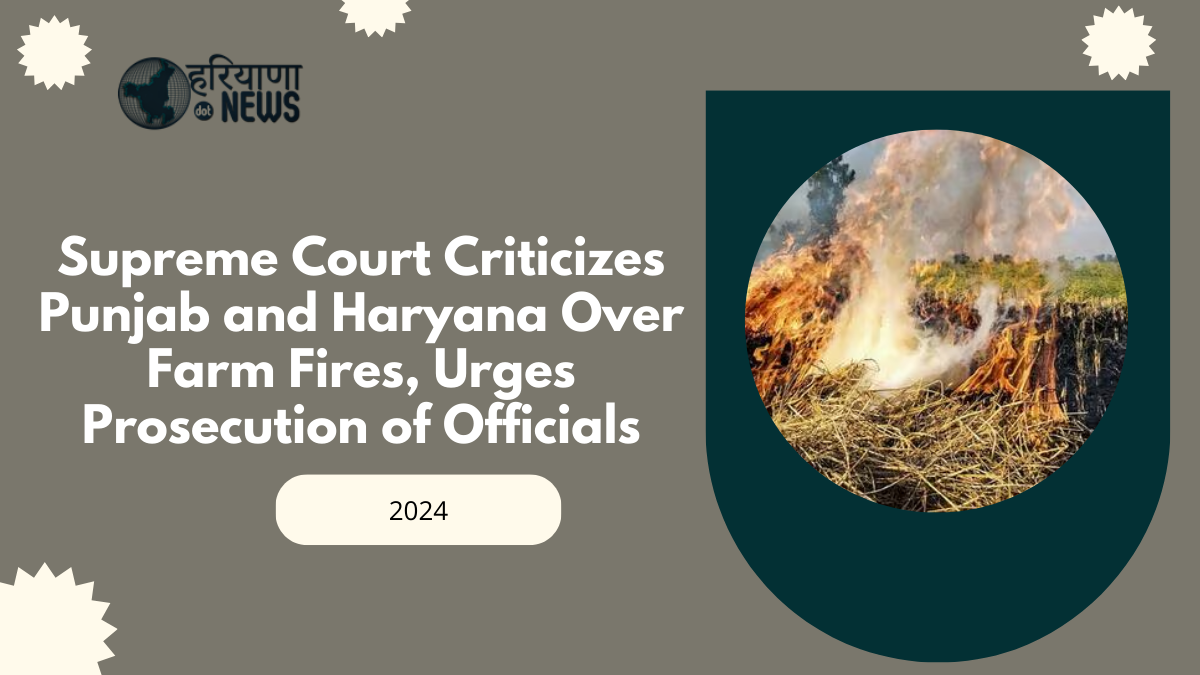The Supreme Court strongly criticized the governments of Punjab and Haryana for their lax approach to handling the issue of farm fires, pointing out that it’s a serious pollution problem that is not being addressed effectively. The court expressed frustration, stating, “This is a grave issue of pollution, and you are treating it lightly.”
On Wednesday, in New Delhi, the Supreme Court addressed the lack of accountability in Punjab and Haryana, where farm fires continue despite regulations. The governments of these states have been issuing small fines but have yet to prosecute a single farmer under the Commission for Air Quality Management (CAQM) in NCR & Adjoining Areas Act, 2021.
Penal Action Ordered Against State Officials
A bench led by Justice Abhay S. Oka ordered state officials to be penalized for failing to enforce the CAQM’s orders. The court also summoned the chief secretaries of both states to appear on October 23 to explain why no firm action has been taken against farmers involved in stubble burning or against the officials who failed to prosecute them.
The bench, which also included Justices Ahsanuddin Amanullah and Augustine George Masih, criticized the casual attitude of the state governments. “Are you saying we should let people suffer from pollution, and there’s nothing you can do?” they questioned, adding that such a dismissive attitude towards a longstanding issue like pollution is unacceptable.
Reports of Stubble Fires and Inadequate Responses
In their affidavits, Haryana reported 191 incidents of stubble burning since last month, while Punjab recorded 267 cases as of October 12. The Punjab government said that fines were imposed and collected in 103 cases, with FIRs registered against 19 offenders under the Bharatiya Nyaya Sanhita and the Environment Protection Act.
However, the Punjab Pollution Control Board (PPCB) data revealed that farm fires in Punjab have surpassed 1,000, with 173 new cases of stubble burning reported just on Tuesday.
Lack of Prosecution Despite Strict Penalties
Despite the alarming numbers, the Supreme Court noted that not a single prosecution has been initiated under the CAQM Act, which allows for a maximum penalty of five years in jail and fines up to ₹1 crore. The court stressed that criminal action is crucial to enforcing these laws and warned that without it, the CAQM’s orders would be toothless.
The bench also referred to an older directive from Punjab, dating back to October 2013, which banned stubble burning with penalties of either three months imprisonment or a fine of ₹10,000. The court questioned why this order had not been enforced in the last 11 years, asking, “Are you saying no one has violated this order since 2013? Why are you shielding people?”
 Delhi’s Toxic Air Crisis: Equivalent to Smoking 49 Cigarettes Daily
Delhi’s Toxic Air Crisis: Equivalent to Smoking 49 Cigarettes Daily
 Haryana Assembly Session Highlights: Government Announces Monthly Allowance for CET-Passed Unemployed Youths
Haryana Assembly Session Highlights: Government Announces Monthly Allowance for CET-Passed Unemployed Youths
 Bulldozer Action on BJP Leader’s Property and Activist’s Tent Sparks Early Morning Tension in Rohtak
Bulldozer Action on BJP Leader’s Property and Activist’s Tent Sparks Early Morning Tension in Rohtak
 CBI Conducts Raid in Panipat Over Multi-Crore Fraud in Online Trading Scheme
CBI Conducts Raid in Panipat Over Multi-Crore Fraud in Online Trading Scheme
 Haryana’s New Four-Lane Expressway to Link Kurukshetra Bypass, Ladwa, and Yamunanagar: CM Saini’s Plans with Gadkari
Haryana’s New Four-Lane Expressway to Link Kurukshetra Bypass, Ladwa, and Yamunanagar: CM Saini’s Plans with Gadkari





Challenges in Implementing Stubble Burning Orders
Punjab’s Advocate General, Gurminder Singh, argued that enforcing the order has been difficult, as officials attempting to stop farm fires were met with resistance and even detained by farmers. However, the bench sharply responded, saying that the 2021 CAQM order must be followed, and the state’s tolerance of repeated violations indicates a significant disregard for the law.
Turning to Haryana, the court criticized the state for not prosecuting a single violator out of the 191 reported cases since September. The bench remarked that Haryana’s chief secretary seemed indifferent to the issue, implying that lenient fines encourage violations rather than deter them.
Urging the CAQM to Act
The court directed the CAQM to take action against officials under Section 14 of the Act for non-compliance and questioned whether the commission itself was receiving the necessary expert advice on air pollution. It was noted that many members of a sub-committee responsible for enforcing CAQM orders had failed to attend meetings, with eight members absent from the most recent meeting on October 8.
The Supreme Court further urged the CAQM to explore alternatives if state governments remain unwilling to prosecute farmers. The court criticized the states’ approach of merely collecting fines, stating that this leniency only incentivizes continued stubble burning. “These fines are not a deterrent—they’re an invitation to keep burning,” the bench observed.
Conclusion
The Supreme Court’s remarks highlight a growing frustration with the lack of enforcement around farm fires, which significantly contribute to air pollution in the region. By summoning the top officials from Punjab and Haryana and ordering stricter actions, the court is pushing for more decisive measures to address this recurring environmental crisis.
Click here to know more.






